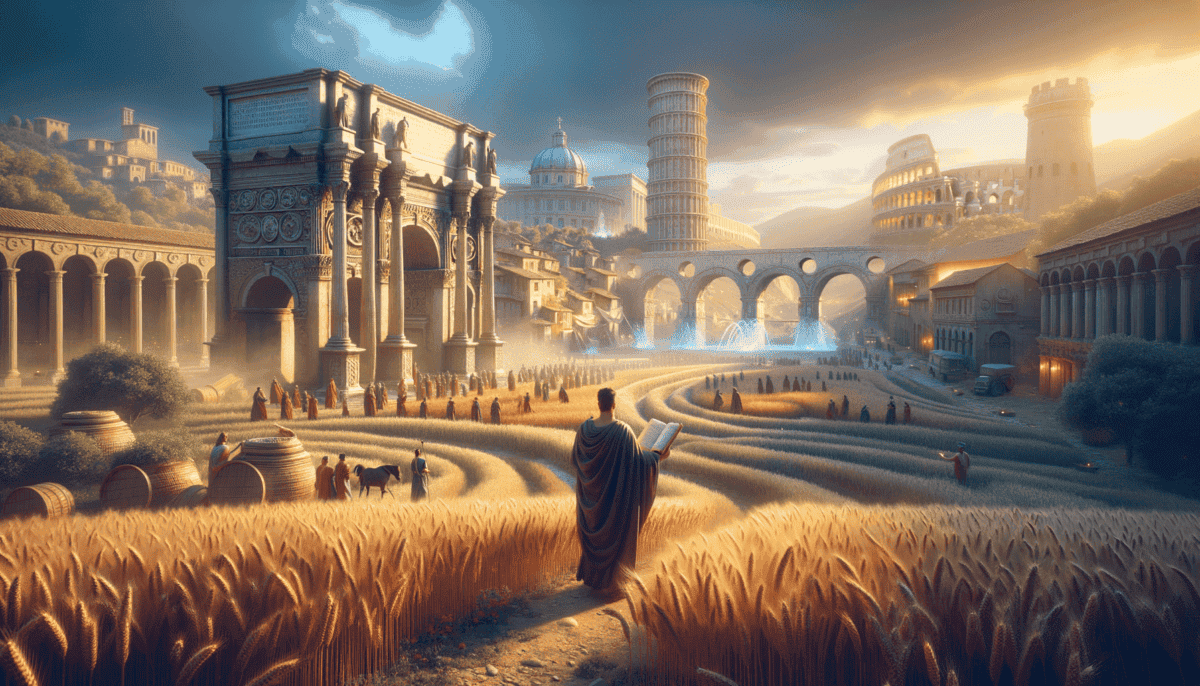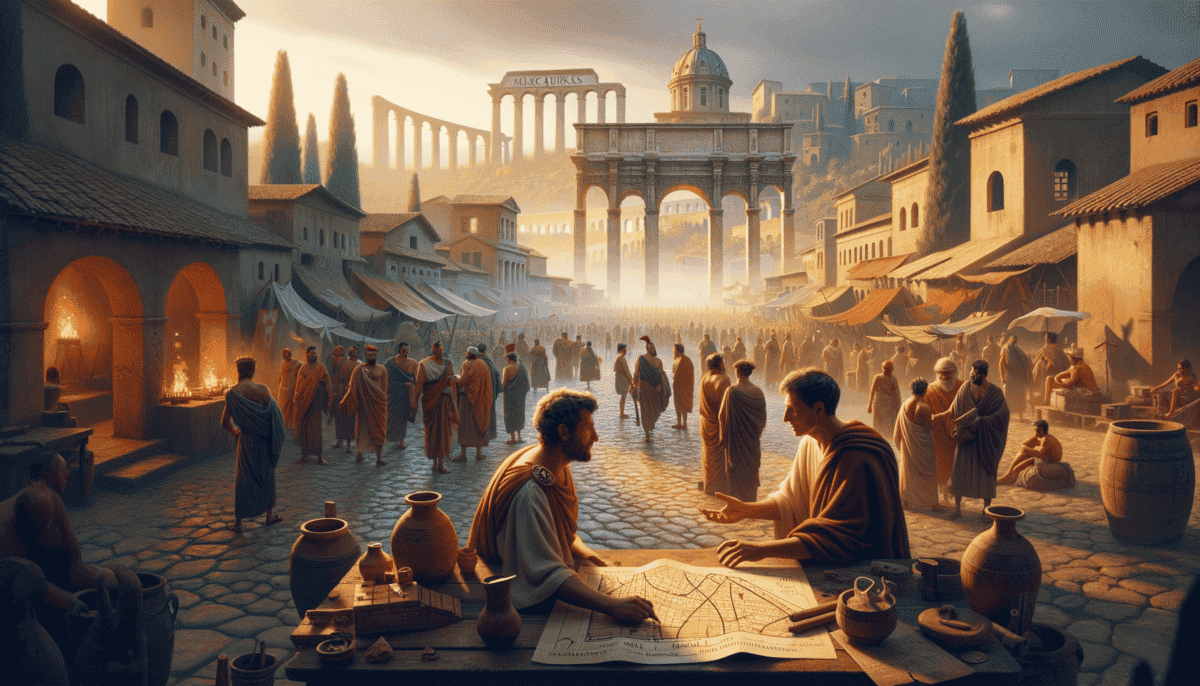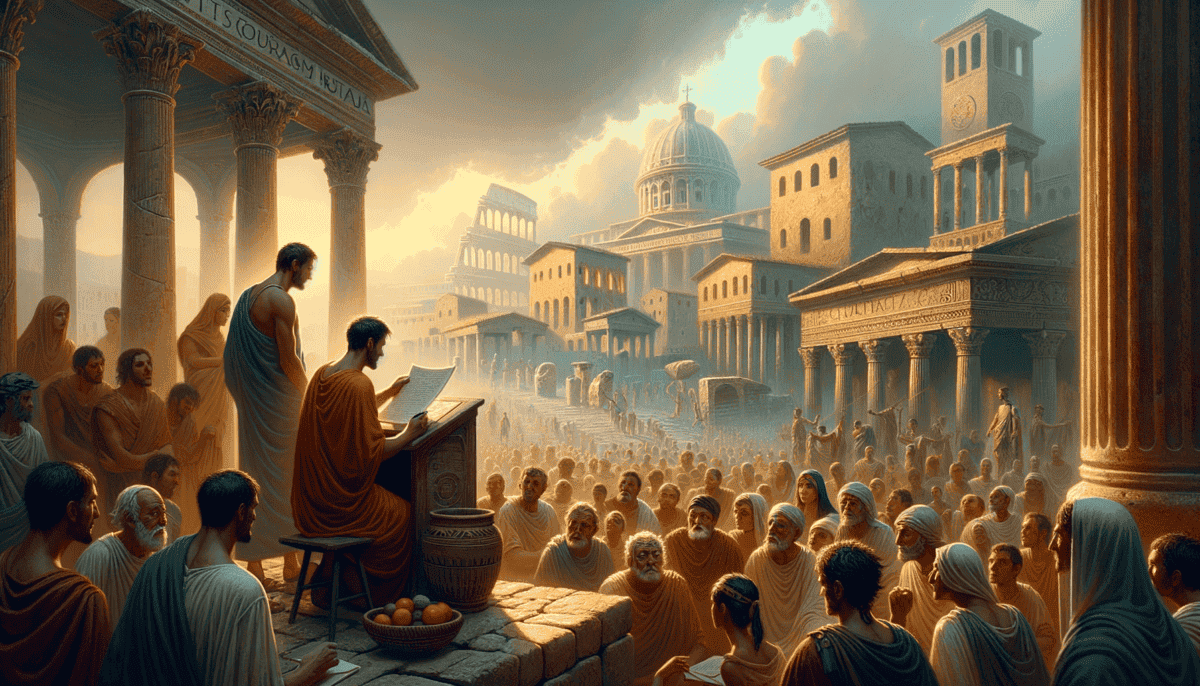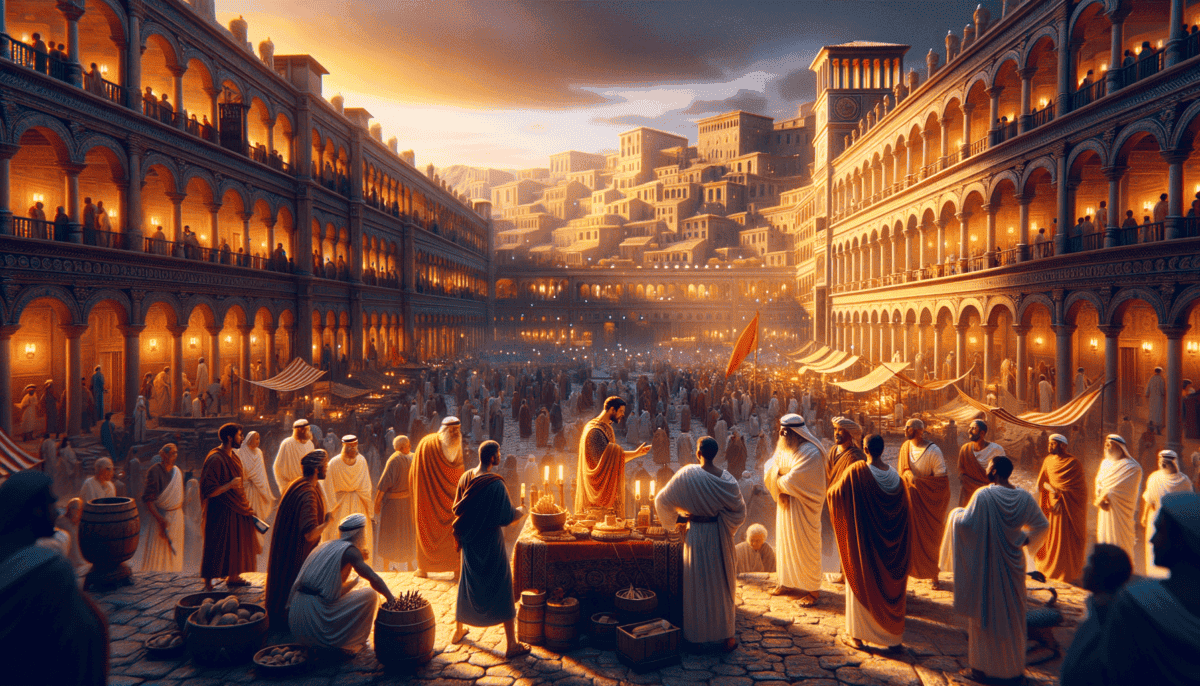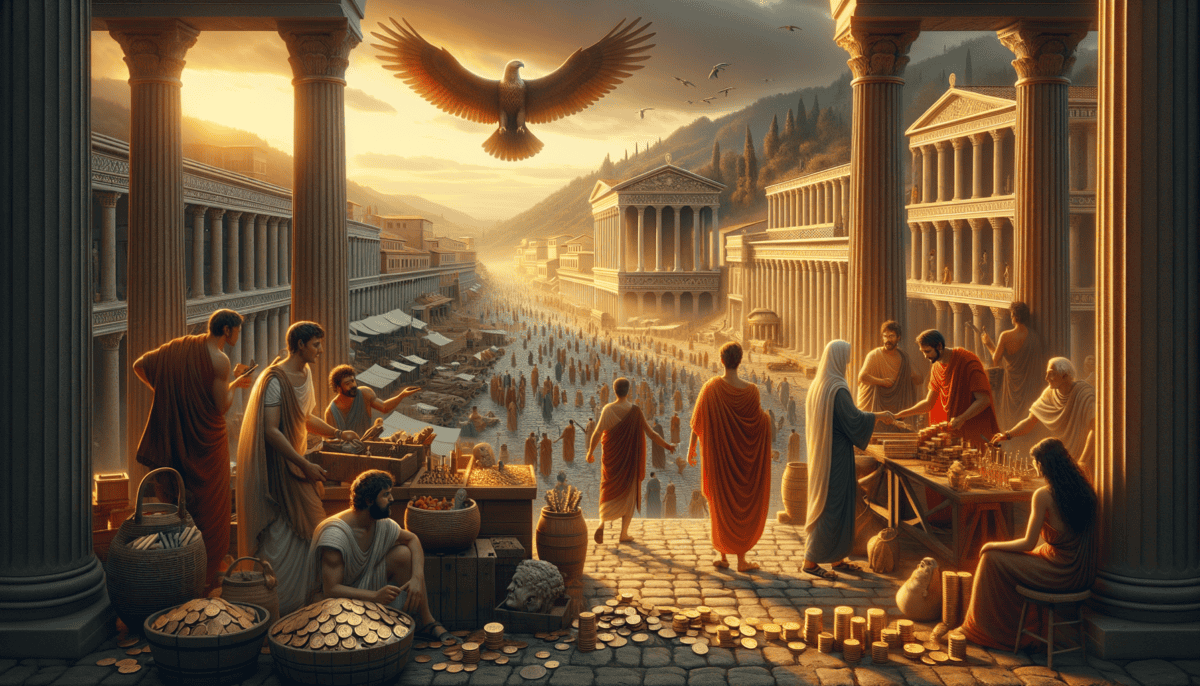The Young Collector
Marcus wiped sweat from his brow as he stood before the giant marble building. The Roman tax office gleamed white in the morning sun. Today was his first day as a tax collector, and his heart beat fast like a drum. ️
"You can do this," he whispered to himself, clutching the wooden tablet in his hands. At seventeen, he was the youngest apprentice tax collector in Rome.
Inside, the halls echoed with footsteps and voices. Older men in white togas hurried past, carrying scrolls and counting coins. Marcus felt small in his simple brown tunic.
"Ah, you must be Marcus!" A deep voice boomed. A tall man with gray hair and kind eyes approached. "I am Flavius, your teacher."
Marcus bowed slightly. "Yes, sir. Thank you for this chance."
"Tell me, boy," Flavius said as they walked, "why do you want this job? Most young men dream of being soldiers or merchants."
Marcus thought of his family's tiny apartment, where his mother mended clothes late into the night to earn extra coins. His father, once a proud carpenter, now struggled with a bad leg.
"I want to help my family," Marcus said. "And… I'm good with numbers."
Flavius nodded approvingly. "Honest answer. But your father disapproves, doesn't he?"
Marcus's shoulders slumped. "He says tax collectors are just thieves in fancy clothes. We argued about it last night."
"Many think that way," Flavius sighed. "But taxes build our roads, feed our armies, and keep Rome strong. Come, let me show you how it works."
They entered a large room filled with shelves of scrolls. Flavius pulled one down and unrolled it on a wooden table.
"Look here," he pointed to neat rows of numbers. "Every citizen must pay their share. Farmers give grain, merchants pay in coins, and craftsmen offer goods."
Marcus leaned closer, fascinated. "It's like a giant puzzle!"
"Exactly!" Flavius smiled. "And you'll help solve it. But remember – behind every number is a real person. We must be fair."
Suddenly, a messenger burst into the room. "Flavius! Trouble in the market – a merchant refuses to pay!"
Flavius stood straight. "Your first lesson begins now, Marcus. Watch and learn."
At the market, they found an angry wine merchant surrounded by a crowd. His face was red as the wine in his clay jars.
"These taxes are too high!" he shouted. "How can I feed my children?"
Marcus watched as Flavius spoke calmly, explained the laws, and worked out a payment plan the merchant could afford. The crowd slowly dispersed.
"You see?" Flavius turned to Marcus. "We're not here to hurt people. We're here to help Rome and her people find balance."
That evening, Marcus walked home with new understanding. He found his father sitting by their small hearth.
"Father," he said quietly. "I know you're disappointed. But I promise to be a different kind of tax collector. One who helps people while serving Rome."
His father looked up, seeing determination in his son's eyes. He didn't smile, but his voice was softer than before.
"Then prove it, son. Show me this job can be done with honor."
Marcus nodded, feeling the weight of the day's lessons. Tomorrow would bring new challenges, but he was ready to learn more about the complex world of Roman taxes – and about himself.
Through the window, he could see the sunset painting the city's buildings in gold. Somewhere in those streets, citizens were counting their coins, wondering how to pay their share. Marcus vowed to help them find a way, one calculation at a time. ⚖️
The Provincial Challenge
The morning sun peeked over rolling hills as Marcus stepped off the dusty road. After two weeks of travel, he had finally reached the small town in Gaul. The air smelled different here – like pine trees and freshly turned earth.
“Welcome to Lugdunum,” said Rufus, his guide. “Your first provincial assignment begins today.”
Marcus adjusted his travel cloak. Everything looked so different from Rome. Instead of marble buildings, wooden houses dotted the landscape. Farmers worked in fields that seemed to stretch forever.
A group of local farmers watched them pass. Some turned away with frowns. Marcus remembered Flavius’s words: “The provinces are different. You must learn their ways.”
At the town’s market, a young girl caught his eye. She had bright red hair and carried a basket of vegetables. When she saw his official Roman tablet, her smile disappeared.
“I’m Aelia,” she said boldly in broken Latin. “You’re here for taxes?”
Marcus nodded. “I’m Marcus. I’m learning to be a tax collector.”
“Tax collectors took half our grain last season,” she frowned. “My father says Rome is too greedy.”
Before Marcus could answer, an older man appeared – Aelia’s father. “Come away, daughter. Romans only bring trouble.”
That afternoon, Marcus visited farms with Rufus. He learned about different taxes:
- Land tax on farms
- Tax on animals and crops
- Special tax for trading goods ️
- Tax for using Roman roads ️
“These people work so hard,” Marcus whispered, watching a family harvest wheat. “And we take so much.”
Rufus shrugged. “It’s how Rome stays strong. Look – they use our roads, our coins, our protection.”
Later, Marcus saw Aelia again by a well. She was struggling with a heavy water jug.
“Let me help,” he offered, lifting the jug.
“Why?” she asked. “You’re Roman.”
“I’m also just a person,” he smiled. “Like you.”
They walked together, and Aelia told him about life in Gaul. About harsh winters, about festivals, about how her people lived before Rome came.
“We’re not angry about paying some tax,” she explained. “But sometimes it’s too much. Last winter, three families lost their farms.”
Marcus felt his chest tighten. He thought of his own family’s struggles in Rome.
That night, in his small room at the inn, Marcus wrote in his tablet: “The numbers tell one story. The people tell another. How do we balance both?”
A commotion outside drew him to the window. Aelia’s father argued with Roman guards about late payments.
“Please,” the farmer begged. “The drought ruined half our crops. Give us more time!”
Marcus watched, remembering the wine merchant in Rome. But this felt different. This wasn’t just about one person – it was about whole families, whole communities.
The next morning, Marcus found Aelia by the market. “Show me your farm,” he said. “I want to understand.”
She led him through fields where workers bent under the hot sun. She showed him storage rooms half-empty from poor harvests. Her father watched from a distance, suspicious but curious.
“You see?” Aelia gestured around. “We work hard. We want to pay our share. But Rome must understand – when the rain doesn’t fall, when the crops fail, we need help too.”
Marcus touched a stalk of wheat, thinking hard. His job was to collect taxes, but Flavius had taught him something else too – behind every number was a real person.
“Maybe,” he said slowly, “there’s a way to make this work better. For everyone.”
Aelia’s eyes brightened with hope. But in the distance, storm clouds gathered over the hills. Changes were coming – to the weather, to the province, and to Marcus himself. ️
Rebellion’s Spark
Dark clouds rolled over Lugdunum as Marcus walked through the marketplace. The air felt heavy with more than just rain. People whispered in corners, their faces worried. ️
“Another farm seized yesterday,” a merchant muttered. “The Claudius family – they had three bad harvests.”
Marcus found Aelia near her family’s stall. Her usually bright eyes looked sad.
“What’s wrong?” he asked.
“The tax collectors came early,” she whispered. “They want double what we paid last year. Father says we might lose everything.”
Marcus felt his stomach twist. He knew the new rules – Rome wanted more money to build roads and pay soldiers. But seeing how it hurt real people made his heart ache.
That afternoon, angry shouts echoed from the town square. A crowd gathered around an old farmer.
“We can’t feed our children AND feed Rome!” the farmer cried. “Something must change!”
People clapped and cheered. Marcus watched from the shadows, his official tablet feeling heavy in his hands.
“When people are hungry, they get angry. When they’re angry, they fight back.” – Marcus remembered Flavius’s words.
At dinner that night, Aelia’s father invited Marcus to their home. It surprised everyone, even Aelia.
“You seem different from other Romans,” her father said. “Maybe you’ll understand. Look at our records.”
He showed Marcus old tablets. The numbers told a clear story:
- Year 1: Normal tax payment ✅
- Year 2: Drought – partial payment
- Year 3: Bad harvest – borrowed money to pay
- Year 4: Now they wanted double!
“We love our land,” Aelia’s father said softly. “My grandfather farmed here. His grandfather too. But Rome’s hunger for gold grows bigger every year.”
Later that night, Marcus heard drums in the distance. People were gathering in secret meetings. The air crackled with tension.
“They’re planning something,” Rufus warned. “Be careful, Marcus. Remember whose side you’re on.”
But Marcus wasn’t sure anymore. He watched Aelia’s family work from sunrise to sunset. He saw children going hungry. He remembered his own family’s struggles.
One morning, he found a message scratched on his door: “Choose wisely, Roman. Storm is coming.” ⚡
In the marketplace, Aelia grabbed his arm. “Marcus, please help! They’re taking our plow animals for tax payment!”
Marcus ran to their farm. Roman guards were leading away two oxen. Without them, how would the family plant next year’s crops?
“Stop!” he shouted. “I’m a tax collector. There must be another way!”
The guards laughed. “Orders are orders, boy.”
That night, Marcus couldn’t sleep. He wrote a letter to Flavius:
The numbers don’t tell the whole story. These are good people. They work hard. But the system is breaking them. What’s the point of collecting taxes if we destroy the very people who pay them?
– Marcus”
The next day, more farms were seized. More families lost everything. Angry voices grew louder.
Aelia found Marcus by the well. “There’s a meeting tonight,” she whispered. “People are tired of being crushed by Rome’s golden fist. Will you come? Will you see?”
Marcus looked at his official tablet, then at Aelia’s hopeful face. He thought about duty, about right and wrong, about the power of choice.
“Yes,” he said quietly. “I’ll come.”
Thunder rumbled in the distance. The storm was about to break – in more ways than one. ⛈️
The Imperial Decree
The morning sun hadn’t yet risen when a messenger galloped into Lugdunum. His horse’s hooves echoed on the stone streets.
“New orders from Rome!” he shouted. “All tax collectors to the forum!”
Marcus’s heart beat faster as he hurried to the square. A crowd of officials gathered around Quintus, the head tax collector.
Gasps filled the air. Marcus felt sick. He thought of Aelia’s family, already struggling with the current rates.
“There’s more,” Quintus continued. “Payment is due within thirty days. No exceptions.”
Marcus raised his hand. “But sir, the harvest isn’t for two months!”
“Then they’ll have to find another way,” Quintus snapped. “Rome’s needs come first.”
Later that day, Marcus walked through the marketplace. People already knew. Mothers hugged their children. Farmers spoke in angry whispers.
“They might as well ask for the moon,” an old merchant said. “We can’t pay what we don’t have.”
Aelia found him near the grain storage. Her face was pale.
“Is it true?” she asked. “Half again more?”
Marcus nodded sadly. “I tried to speak up, but-“
“Words won’t feed people,” she interrupted. “We need action!”
That evening, Marcus sat at his desk, staring at the new tax scrolls. The numbers seemed to dance before his eyes:
| Old Tax | New Tax |
| 100 denarii | 150 denarii |
A knock at his door made him jump. It was Rufus, looking worried.
“The people are gathering outside town,” he whispered. “They’re talking about rebellion!”
Marcus grabbed his cloak. In a clearing beyond the city walls, hundreds of people huddled around torches.
Aelia’s father stood on a cart, speaking: “Rome pushes too far! We must stand together!”
The crowd cheered. Marcus saw faces he knew – the baker, the blacksmith, farmers from every village.
Suddenly, horns blasted. Roman soldiers appeared!
“Disperse immediately!” their commander ordered. “Unauthorized gatherings are forbidden!”
Chaos erupted. People ran. Children screamed. Marcus lost sight of Aelia in the confusion.
The next day, Marcus had to make his collection rounds. Each door that opened showed faces filled with fear or anger.
“Please,” a woman begged, holding a baby. “We already sold our jewelry. We have nothing left.”
At the market, prices were rising. People fought over bread. Guards stood on every corner.
Quintus called another meeting. “Anyone helping tax evaders will face severe punishment. Remember where your loyalty lies.”
But that night, Marcus made a secret decision. He pulled out his record tablets and began to write. His hands shook, but his heart felt steady.
Aelia found him at dawn by the temple.
“I need your help,” he whispered. “I have a plan. But it’s dangerous.”
She squeezed his hand. “Sometimes doing what’s right IS dangerous.”
Marcus looked at the rising sun. He thought about Rome, about duty, about justice. About choices that change lives.
The dawn painted the sky red. Storm clouds gathered on the horizon. Change was coming to Lugdunum.
A Choice of Conscience
Marcus sat in his small office, candlelight flickering across the tax records. His plan was simple but dangerous.
“Careful,” Aelia whispered, watching him adjust numbers in the ledgers. “One wrong mark could give us away.”
Marcus nodded, his quill scratching softly. He was recording only two-thirds of each family’s harvest, making the new taxes almost equal to the old ones.
“What about the missing amounts?” Aelia asked.
“I’ve thought of that,” Marcus smiled. “The winter floods damaged many storage buildings. Who can count wet grain exactly?”
But their work was interrupted by shouting outside. Marcus quickly hid the records as Rufus burst in.
“Tax inspectors!” he gasped. “From Rome! They’re checking everything!”
Marcus felt his heart freeze. Imperial inspectors were like hawks – they saw everything.
“They’re starting at the north end,” Rufus added. “You have maybe one hour.”
Aelia grabbed Marcus’s arm. “My father’s village is next on your list. If they find out-“
“They won’t,” Marcus said firmly. He grabbed his cloak. “Get everyone ready. We need to move fast!”
| Time Left | Villages to Warn |
| 1 hour | 5 villages |
Racing through muddy streets, they split up to spread the word. Farmers quickly moved grain, hiding extra stores in secret cellars.
“The inspectors are getting closer!” a boy shouted from his lookout on the temple roof.
Marcus worked faster, helping villagers adjust their counts. His hands trembled, but his writing stayed neat.
Suddenly, horns announced the inspectors’ arrival. Quintus led them straight to Marcus’s office.
“Your records, boy,” the chief inspector demanded. His cold eyes missed nothing.
Marcus handed over his tablets, praying his changes would hold. The inspector read slowly, checking each number.
“These flood damages,” he frowned. “Quite extensive.”
“Yes, sir,” Marcus kept his voice steady. “The river was very high this year.”
Aelia watched from the doorway, holding her breath. One wrong word could ruin everything.
The inspector pulled out his own records. “Our reports show-“
CRASH! A cart overturned outside, spilling vegetables everywhere. The inspector turned to look.
In that moment, Rufus slipped in through the back door, switching the inspector’s records with identical-looking tablets they’d prepared.
When the inspector turned back, everything matched perfectly.
“Well organized, young man,” he said finally. “Rome appreciates efficiency.”
After they left, Marcus sank into his chair, shaking. “That was too close.”
“But it worked!” Aelia hugged him. “You saved so many families!”
That evening, Marcus watched farmers returning home. Children played in the streets again. The fear was lifting.
But his relief was short-lived. A messenger arrived with news from the capital.
“Marcus,” Rufus read the scroll, face pale. “They’re sending someone else. Someone who knows about missing grain…”
The sun set behind dark clouds. Marcus knew his real test was still to come. ⚡
A Legacy of Justice
The morning sun cast long shadows as Marcus stood before the village council. His heart was racing, but his voice stayed strong.
“I know why you’re all scared,” he said. “The new inspector, Cassius, arrives tomorrow.”
Aelia stepped forward. “He’s known for being strict. He never believes flood damage stories.”
The room buzzed with worried whispers. Marcus raised his hand for quiet.
“I have a plan,” Marcus smiled. “But I need everyone’s help.”
That day, the whole village worked together. They moved grain into special underground rooms that Marcus’s father had taught him about years ago.
“These storage rooms saved my family during hard times,” Marcus explained. “Now they’ll help save yours.”
Aelia organized the children into playing games near the village entrance. They would watch for Cassius and signal when he came.
The next morning, a young boy ran into the village. “He’s coming! On a white horse!”
Marcus took a deep breath and walked out to meet Cassius. The inspector was tall and serious-looking.
| What They Had | What They Showed |
| Full harvest | Just enough |
“Young Marcus,” Cassius said. “I’ve heard interesting stories about you.”
“All good ones, I hope,” Marcus tried to smile.
Cassius didn’t smile back. “Show me everything.”
They walked through the village. Marcus showed Cassius the tax records, the grain stores, everything looking just right.
But then Cassius stopped. He was looking at the ground near the temple.
“Fresh dirt,” he said. “Recently moved.”
Marcus’s heart jumped. Had they missed covering one of the secret storage rooms?
Just then, Aelia came running up. “Oh, that was us! We’re planting a new garden for the temple. Want to help?”
Cassius looked surprised. Nobody had ever asked him to help before.
“I… well…” he stuttered. For the first time, he looked human instead of scary.
That’s when Marcus understood something important. Cassius wasn’t just an inspector – he was a person too.
“Sir,” Marcus said quietly. “Would you like to know the real story of this village?”
Over dinner that night, Marcus told Cassius everything. About the families struggling with taxes. About trying to help them stay on their farms. About wanting to be fair to both Rome and the people.
Cassius listened quietly. Finally he spoke.
“I was poor once too,” he said softly. “Before I worked for Rome.”
The next day, Cassius made his report. He wrote that the village was working hard and paying what they could. He even suggested lowering some taxes!
“Why did you help us?” Marcus asked as Cassius prepared to leave.
“Because you showed me something I’d forgotten,” Cassius smiled. “Good leadership means helping people, not just collecting coins.”
Years later, Marcus became a teacher of tax collectors. He taught them to be fair and kind. The village grew strong and happy.
And every spring, they still plant flowers in the temple garden – right over those old storage rooms.
Sometimes the best treasures aren’t gold or taxes, but the courage to do what’s right. Marcus and Aelia’s village proved that being fair and helping others makes everyone richer in the end.


